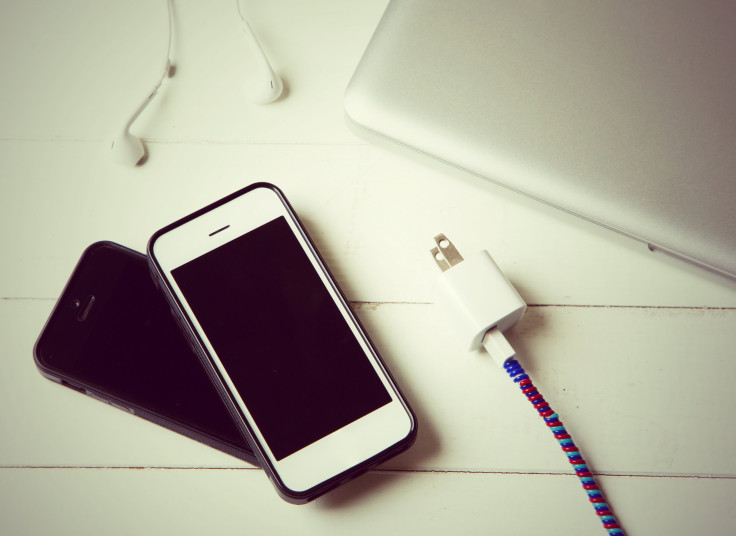Out Of Sight, Out Of Mind? Cell Phones May Diminish Cognitive Ability Even Without Use

The digital age has been dubbed the “age of distraction” as more and more people have become attached to their cell phones. Cell phones have become one of the biggest sources of multitasking, providing access to games, text messages, emails, all while you’re at work, driving, walking, shopping — and even in the bedroom. Now, a recent study published in the journal Social Psychology found the mere presence of a cell phone can distract you by diminishing your attention span and cognitive ability, even without using it.
It’s human nature to get sucked into phone conversations, especially when you’re not on your phone but overhearing someone else. The irresistibility of cell phones steals away your attention, and much more than an old-fashioned, face-to-face conversation due to “constant connectivity.” A 2013 study published in the journal PLOS ONE found cell phone conversations are attention-grabbing more so than face-to-face conversations because bystanders do not have much control over the personal conversations they’re exposed to, increasing their annoyance and frustration.
Overhearing people’s loud cell phone conversations could distract others to the point of reduced productivity. While seeing or hearing other people use their cell phones can diminish productivity, can the mere sight of a cell phone have the same effect?
Bill Thornton, lead author of the new study and psychologist at the University of Southern Maine, and his colleagues sought to unveil whether simply the presence of a cell phone and what it might represent — social connections, broader social network, etc. — can be similarly distracting and have negative consequences in social interaction. The researchers recruited students in two separate statistics classes to take part of the study, which involved two versions of the attention-testing tasks. One of the taks was simple, and the other was more challenging.
In both versions, the participants were presented with a page of 20 rows of single digit numbers singly spaced. The less challenging task was a simple “digit cancellation” task. Each row of digits in this task was preceded by a “target number” that the subject had to circle and then proceed to cross off each occurrence of the number appearing in that row; then on the next row with a different target number such as 2: 382-162-75, according to NY Mag.
The more challenging task, the “additive cancellation” task, involved participants to look at a row of digits that was preceded by a "target number," which they would circle and then proceed to cross off any two adjacent numbers that "added up" to their target number. For example, 3: 32-1-6183-0-5.
The students were allowed to keep their phones on their desks while they worked on the cancellation tasks in one of the statistics classes. They were allowed to use their phone because one of the tasks would be asking about the type of cellphone they used. However, the other class was told to keep their phones out of sight.
The findings provided further evidence that the “mere presence” of a cell phone may be a sufficient distraction that leads to a reduced attention span and poor performance on tasks, especially those that require greater attention and cognitive abilities. Students who could not see their phones did better on both tasks, especially on the more challenging one. These students got an average of 26 correct compared to the other group’s average of 21.
This supports the belief that constant connectivity throughout the day provides a continual source of interruptions and distractions even when you’re not using your cell phone. It affects the ability to maintain attention and to concentrate deeply about other things. This continues to become more commonplace in society, as at least 85 percent of people in the U.S. have cell phones, while over 50 percent of these users now have smartphones, according to PewResearch Internet Project.
A similar 2012 study published in the Journal of Social and Personal Relationships found even just the presence of a cell phone can influence the quality of face-to-face conversations. People who engaged in personal discussions when a phone was nearby, even if the couple wasn’t using it, reported lower relationship quality and less trust from their partner. The participants believed their partner was less empathetic to their concerns.
The presence of a cell phone can make you more inclined to hear conversations, weaken your ability to connect with other people, especially if something meaningful is being discussed, and diminish attention span and cognitive ability. The will power to disconnect and put away the cell phone could be a simple case of self-control. It all comes down to whether you’re able to deal with FOMO, the Fear Of Missing Out.
Sources: Faires A, Robbins M, Rollins E, and Thornton B. The Mere Presence of a Cell Phone May be Distracting: Implications for Attention and Task Performance. Social Psychology. 2014.
Galvan VV, Golley MT, and Vessal RS. The Effects of Cell Phone Conversations on the Attention and Memory of Bystanders. PLOS ONE. 2013.
Przybylski AK and Weinstein N. Can you connect with me now? How the presence of mobile communication technology influences face-to-face conversation quality. Journal of Social and Personal Relationships. 2012.



























